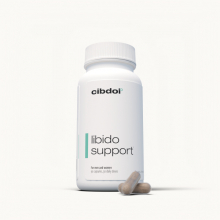Why Do I Have No Sex Drive?
Published:
A lack of sex drive can be concerning and frustrating. But don't worry - with some detective work, you can get to the root of the problem.
Contents:
- What Is a Normal Sex Drive?
- Why Has My Sex Drive Decreased?
- Why Do I Have No Sex Drive?
- Getting to the Root of Low Libido
- Seeking Help for Low Libido
- Regaining Your Sex Drive is Possible!
- Frequently Asked Questions About Low Sex Drive
- What is considered a low sex drive?
- What causes low libido in females?
- What causes low libido in males?
- How do I increase my sex drive naturally?
- When should I see a doctor for low libido?
- What treatments are available for low sex drive?
- What if my partner has a much lower sex drive?
Let's explore the common causes of low libido so you can regain your passion and enjoyment of sex.

What Is a Normal Sex Drive?
Sex drive varies from person to person. There's no "right" amount of sexual desire.
If your level of desire causes distress or relationship problems, then low libido is a concern worth addressing.
But remember, normal is different for everyone. Pay more attention to changes in sex drive, rather than comparing yourself to others.
Why Has My Sex Drive Decreased?
Many factors can dampen your enthusiasm for sex. The key is pinpointing the reasons in your unique situation.
Some of the most common causes of reduced libido include:
Physical Causes
- Low testosterone
- Other hormone imbalances, like low estrogen in women
- Medical conditions like diabetes, high blood pressure, or thyroid disorders
- Prescription medications, especially antidepressants, blood pressure drugs, and opioids
- Alcohol or drug use
- Fatigue or lack of sleep
- Pain during sex
Psychological Causes
- Stress and burnout
- Depression and anxiety
- Poor body image or low self-esteem
- Trauma or abuse
- Feelings of anger or resentment in a relationship
- Boredom with routine
Lifestyle Factors
- Nutrient deficiencies from poor diet
- Weight gain
- Lack of exercise
- Too much or too little physical intimacy
Why Do I Have No Sex Drive?
If you're wondering why your sex drive has taken a nosedive, examine your lifestyle and health for clues.
Consider when you first noticed the change. Did it coincide with starting a medication, altering your diet, or going through something stressful?
Think about times when your libido feels highest, and when it completely vanishes. What’s different about those times?
Track your energy levels, mood, sleep, diet, and stress levels. Lifestyle factors hugely impact sexual desire.
Opening up to your partner can provide insight too. Explore their perspective on when your sex drive changed, and brainstorm reasons together.
Getting to the Root of Low Libido
Decreased desire is complex. The reasons can be difficult to untangle.
Here are tips for identifying the core factors impacting your sex drive:
Get a Checkup
See your doctor for a full physical exam. Discuss any concerns about hormones, medications, chronic health conditions, pain, or medical treatments affecting libido.
Blood tests can check hormone levels and reveal nutritional deficiencies, thyroid problems, and diabetes - all linked to low sex drive.
Don’t just accept it if your doctor says the problem is age or “all in your head.” Ask questions and request they investigate further.
Track Your Cycles
Women should track their menstrual cycle. Low estrogen around the time of your period can slash libido.
Try keeping a daily journal of desire levels, energy, moods, and menstrual flow. Cyclical patterns may emerge.
Consider Supplements
Boosting key nutrients can revive your sex drive. Try supplements like zinc, magnesium, iron, and vitamin D if levels are low.
Discuss with your doctor about supplementing with DHEA or testosterone therapy if hormonal causes are suspected.
Manage Stress
Chronic stress can sap all your energy - leaving none for passion.
Make more time for relaxing activities. Try yoga, massage, meditation, or whatever nurtures you.
Cut back obligations that drain you. Prioritize rest, fun, and intimacy.
Improve Your Body Image
When you feel good about your body, it’s easier to get aroused.
Focus less on flaws, clothes size, or numbers on the scale. Instead, appreciate your body’s health and strength.
Do more of what makes you feel confident and sensual. Dance, self-care rituals, or time in nature can help.
Spice Things Up
If sex has become boring or routine, experimenting can rekindle excitement.
Flirt throughout the day and try new touches, positions, locations, toys, role play, or watching erotic films together.
Keep communicating to learn one another’s needs. Aim for pleasure and connection, not performance.
Seeking Help for Low Libido
If self-help strategies aren’t improving your sex drive after a few months, seek professional support.
Talk to your doctor about referring you to specialists like:
- Sex therapists - help overcome obstacles to intimacy and improve communication.
- Pelvic floor physical therapists - address pain during sex.
- Endocrinologists - diagnose and treat hormone imbalances.
- Psychiatrists or therapists - address mental health impacts like depression, anxiety and trauma.
Medications like testosterone or estrogen therapy, bupropion, buspirone, flibanserin, and bremelanotide can also aid libido in some cases.
Discuss risks, benefits, and alternatives with your doctor.
Regaining Your Sex Drive is Possible!
Don’t lose hope if your sex drive has taken a hit. Identifying the root causes and making targeted lifestyle changes can rekindle your passion.
Be patient and keep the spark alive through sensual touch, intimacy, and closeness.
With guidance from professionals and ongoing communication with your partner, you can regain your enjoyment of sex and physical connection.
The journey to higher libido may have ups and downs. But know that more satisfying sex is within your reach by taking it step-by-step.
Frequently Asked Questions About Low Sex Drive
Having little desire or interest in sexual activity is a common issue that can impact wellbeing and relationships. Here are answers to some of the most frequently asked questions about low libido.
What is considered a low sex drive?
There is no quantitative definition of a low sex drive, as sexual desire varies widely among individuals. If your level of interest in sex causes distress or interferes with your relationships, then low libido is a problem worth addressing.
What causes low libido in females?
Reasons women may lose interest in sex include:
- Hormonal changes - such as menopause, postpartum, or birth control side effects
- Medical conditions - like cancer, diabetes, high blood pressure
- Medications - especially antidepressants, blood pressure meds
- Mental health issues - anxiety, depression, trauma
- Body image dissatisfaction
- Relationship problems or lack of emotional intimacy
- Fatigue, stress, or sleep deprivation
What causes low libido in males?
Factors contributing to reduced sex drive in men include:
- Low testosterone
- Chronic illness - such as heart disease or obesity
- Prescription drugs - steroids, opioids, antidepressants
- Alcohol or substance abuse
- Emotional issues - stress, poor body image, anxiety
- Erectile dysfunction
- High blood pressure or high cholesterol
- Relationship problems and lack of communication
How do I increase my sex drive naturally?
Ways to boost libido without medication include:
- Reduce stress through yoga, meditation, or massage
- Get enough high quality sleep
- Eat a nutritious diet and stay hydrated
- Exercise regularly
- Set the mood with music, candles, or romantic ambience
- Improve intimacy through sensual touch, caressing, and extended foreplay
- Communicate desires, fantasies and feedback with your partner
- Plan romantic getaways or fun dates together
- Try supplements like zinc, magnesium, iron, and vitamin D
When should I see a doctor for low libido?
Consult your physician if low desire:
- Develops suddenly or severely
- Disrupts your relationships
- Coincides with other symptoms like pain, changes in period, or erectile dysfunction
- Doesn’t improve through lifestyle changes and self-help strategies after a few months
Doctors can check hormone levels, screen for underlying health conditions, and refer you to specialists if needed.
What treatments are available for low sex drive?
Treatment options may include:
- Sex therapy or couples counseling
- Hormone replacement therapy - testosterone, estrogen
- Treating underlying health conditions
- Changing medications that reduce libido
- Psychotherapy for mental health issues
- Prescription medications to boost arousal
- Pelvic floor physical therapy for pain
- Working through relationship difficulties
- Lifestyle changes like improved sleep, diet, exercise and stress management
The ideal solutions are tailored to your unique symptoms and situation. Discuss pros and cons of different approaches with your healthcare provider.
What if my partner has a much lower sex drive?
Tips for navigating desire discrepancy in a relationship include:
- Communicating openly about needs, feelings and expectations
- Focusing on intimacy and whole-body sensuality, not just intercourse
- Making quality time together a priority
- Compromising on sexual frequency
- Exploring creative sexual activities you both enjoy
- Understanding differences in age, health status, stress levels or medications
- Getting counseling to address relationship issues impacting libido
- Being patient, flexible and keeping a sense of humor
Prioritizing intimacy and pleasure over specific frequency goals can help partners with mismatched libidos maintain a fulfilling sex life and bond.










